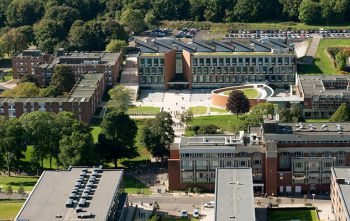Learn more about life at Sussex. For students, by students.
More than just life experience: How work prepared me for uni
By: James Andrews
Last updated: Tuesday, 7 October 2025

Starting university as a mature student often means bringing a wealth of life experience, especially work experience. While we sometimes describe mature students as being more confident or offering different perspectives in seminars (which is true), there’s much more to it. The professional skills we’veacquired over the years can give us a significant advantage, even if we don’t always recognise it initially.
Before enrolling at Sussex, I had already worked in various sectors. The last job I held before starting university – and the one I continued part-time during my Foundation Year – was at a third-party agency for telephone fundraising. My role involved training new fundraisers, briefing them on new campaigns and charities, coaching them one-on-one, and sometimes leading group coaching sessions. I also tackled unexpected issues, like when our phone system failed while working from home. I quickly arranged an impromptu Zoom training session to maximise our productivity during the shift. Additionally, I was responsible for creating and delivering presentations, listening to calls and scoring them for quality, and meeting with charity clients as an account executive and later as an account manager.
Before that, I worked in stock management. While it may seem unrelated, that job – like all my previous roles – taught me how to prioritise tasks, meet deadlines, work under pressure, and adapt to change. These skills aren’t always highlighted in a university prospectus but have been invaluable in my studies. Upon starting university, I realised I was already comfortable with tools like Microsoft Word, creating presentations, organising my time, and communicating clearly. I knew how to juggle multiple tasks, meet deadlines, and work independently. I had experience running meetings, writing reports, delivering feedback, and adapting to different working styles. While these weren’t traditional “academic” skills, they transferred easily to university life. Writing essays, preparing seminar notes, and giving presentations felt manageable because I wasn'tstarting from scratch. I had to learn to reshape what I knew to fit this new context.
Moreover, my years of work experience provided me with a different kind of confidence. Although I didn’t always feel confident – imposter syndrome is real – my experience navigating challenging situations, collaborating with diverse individuals, and thinking on my feet helped immensely. I didn’t realise how beneficial that would be when tackling complex readings, participating in class discussions, or reaching out for support when needed. The key takeaway is that mature students often bring a whole toolkit of skills that may not appear on a UCAS application but make a significant difference in daily life. It’s not just that we’re older or more “serious” about our studies. We’ve spent years in roles that required organisation, communication, flexibility, and resilience. We’ve had to solve problems and get things done, which translates well to academic life.
So, if you’re a mature student wondering whether you’re starting at a disadvantage, remind yourself that you’re not. In many ways, you’re ahead. Your work, regardless of the field, has equipped you with strengths that will continue to serve you throughout your studies. You already know more than you think, and you truly belong here.
Lou studies Criminology and Criminal Justice at Sussex. She loves running and dogs.
